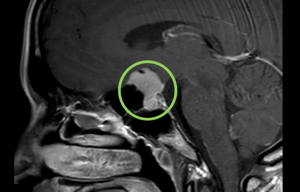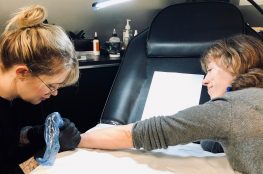I realise I am going a bit back and forth in my story about my meningioma, surgery and recovery. Last time I wrote about having a cortisol profile test and today I thought I’d go back a few steps in the timeline and share a bit more about the diagnosis, risks and the many questions I (and family) had days and weeks after I found out.
Diagnosis
I already mentioned how I was diagnosed, but I thought I’d share some more details of the whereabouts of the meningioma. There are so many different kinds and places this thing can grow having all sorts of different impacts. Some people won’t ever be disturbed by it because it remains small and tucked away not affecting anything. It could be anywhere. It can grow for years (5 or 10 or more) until any symptoms show. It also occurs more often in older woman, i.e. end of forties and up. So in my case it was rare already due to my age and as the rarity wasn’t enough, the gem also decided to, what felt like, grow at the worst possible place ever, but not uncommon.
It’s best shown in my head scan. I choose to share this because I, myself, didn’t find anything that I could compare my situation with to understand fully what it meant because of everything just mentioned. Also, I am a visual person with a vivid imagination that sometimes knows no end. Not having something that may have been remotely close to my own diagnosis to look at, to understand how someone else went through it and recovered was very difficult for me. I think, at least, it could have sped up the grief and acceptance had I had something more tangible.

In the pretty picture you can see the white bit in the middle (so nicely highlighted by the circle). The meningioma sat behind the optic nerves and squashed them, pressed on the pituitary gland (that little pea), was close to where the sense of smell is triggered and was near the spinal cord.
Risks
Because the MRI scan only shows so much and you can’t tell whether the mass is soft or firm (or other) until the surgeon was inside my head, the risks varied. Location is everything, as you’d have guessed, so each of the elements involved presented a risk for damage.
- Full or partial loss of eyesight.
- Loss of sense of smell.
- Seizures.
- Stroke.
- Removal of the whole tumour not possible.
- No or little hormone production due to damage of the pituitary gland, impacting:
growth, blood pressure, certain functions of the sex organs, thyroid glands and metabolism as well as some aspects of pregnancy, childbirth, nursing, water/salt concentration at the kidneys, temperature regulation and pain relief.
I consider myself very lucky. I haven’t lost my eyesight nor my overall sense of smell, though I still can’t smell anything through the right nostril. I haven’t had any seizures, my hormones are more or less functioning (read more here).
The surgery itself was done through the head (read below) to try to avoid the risks mentioned.
Questions & Answers
I have to say my neurosurgeon is brilliant. Since I was going away for a few weeks right after the diagnosis, he answered any and all questions I had via email.
- Have you got any more information what type of surgery it would be? (through the nose or head?)
I think this would need to be operated on through the head. The reason is that the tumour looks to be quite attached to the large blood vessels and the optic nerves. Access through the head allows us to deal with this more safely than through the nose. Although an operation through the nose would be possible I think the danger would be in freeing the tumour from these structures. If the tumour is stuck here one has much better control when operating through the head. There is also a tongue of tumour in the bony canal which transmits the right optic nerve and this would be very difficult to access safely via the nose.
- Can you please explain why radiation in this case is not possible before or after the operation to help with the removal of the tumour?
Radiation treatment would not be appropriate in view of the proximity of the optic nerves and large blood vessels mentioned above. It is very difficult to ensure there is an adequate cut-off of the x-rays so that enough is given to the tumour but not so much that the nerves or blood vessels are injured. As a general rule, if surgery is possible, which it is in this case, it is preferable to radiotherapy. Radiotherapy would not help with removal of the tumour, in fact, it makes it more difficult.
- You mentioned, that there is a likelihood that my sense of smell and the pituitary gland could be damaged. What are the likelihoods for either?
It is possible that your sense of smell could be preserved by doing the operation through the head. There are two nerves from the nose and although one is likely to be affected I would hope to maintain the function of the other. Similarly it may be possible to preserve some function of the pituitary gland but it does look quite compressed already and may not be functioning well at the moment. Surgery is unlikely to make that better but radiotherapy would definitely abolish its function altogether.
- If the sense of smell would be damaged, how will this impact my sense of taste?
One sense of “taste” is almost entirely one sense of smell in fact, so loss of the sense of smell would be a deficit although not incapacitating.
- How quickly will my eyesight recover?
Once the pressure on the nerves is relieved they often recover quickly (weeks) although it can take many months. If there has been severe compression it may mean that some part of the vision would be lost permanently. The primary objective is to stop the vision deteriorating any further which it would do if nothing were done.
- Depending on the type of surgery, you mentioned I might be in the hospital for up to 5 days. Can you explain the recovery process please?
With surgery through the head it generally takes longer to recover but I would expect you to be in hospital for about a week to ten days. Thereafter it would be a matter of gradually building up your physical activity over the course of at least 3 months. It is very common after this sort of surgery to feel “washed out” for this long. However, there would be no restriction on you doing yoga or other physical activity as soon as you feel up to it.
- How can I prepare for the surgery? Are there any specific things to pay attention to such as diet and fitness?
There are no specific things you can do to help with the surgery.
Side note on this: I think because I tried to stay as fit as possible until the surgery (lots of leg and core work due to laying down loads after), I think I managed to recover quicker than if I hadn’t.
- How many times have you come across this type of meningioma and how many times have you done a similar surgery successfully?
This is a not uncommon site for a meningioma and other tumours so it is an operation I do regularly. The success depends very much on how stuck to the nerves and blood vessels the tumour is but I would anticipate being able to remove the tumour successfully.
- Have you had a patient before in a similar situation as me? (age, life stage etc) I think it might be good to talk to someone who was in a similar situation as me, if that is at all possible.
I could sort out some support and perhaps a similar patient.
I got in contact with a patient who had surgery a couple of months before me and also contact details to the specialist nurse at the hospital.
- Is it an awake operation?
The operation is with you completely asleep. No need to be awake.
- Is the scar from the operation very big and visible afterwards? How long does it take to heal? Will you need to shave off all my hair?
The scar is behind the hairline. We only need to shave a narrow strip like an “Alice band”. It heals very quickly (about 10 days).
- How soon after could I return to work?
Realistically I would plan to be off work for about three months.
- How long does the surgery last?
A minimum of 2-3 hours. It depends on the density and type of mass to see how complicated it’ll be to remove everything. I will only be able to know this once I can see.
These are the main questions that I had and needed answering. If you have other questions that I didn’t cover in this post, I am happy to answer them as best as I can, so feel free to post any questions below.
Thanks for sticking with the read until now. I realise this is quite a lot of material, but hopefully sheds some more light to the situation.




27 March 2017
[…] My Meningioma: Diagnosis, Risks & Questions […]
12 April 2017
[…] that I had a benign brain tumour that had to be taken out via surgery. Naturally, there were some risks and open questions involved that had me in a right state of […]
24 May 2017
[…] involved and the location of the meningioma would be useful for your eyes and understanding, so head on over here before continuing. Otherwise, no […]